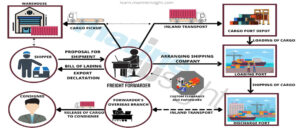By Barrister Alban Igwe
What is Freight Forwarding?
Freight forwarding is the planning and coordinating of the movement of commodities across international borders, on behalf of shippers in compliance with national and international laws and regulations.
Who is a freight forwarder?
The freight forwarder is a practitioner consultant acting on behalf of the shipper to move goods between international destinations in compliance with national and international laws and regulations
When a person is deemed to practice as a freight forwarder
• Section 24 (1) of CRFFN states that… “ a person shall be deemed to practice as a freight forwarder if in consideration of remuneration received or to be received and whether by himself or in partnership with any other person-
• (a) he engages himself in the practice of freight forwarding or holds himself out as a freight forwarder; or
• (b) he renders professional service or assistance in or about matters of principle or detail relating to freight forwarding; or
• (c) He renders any other service which may by regulations made by the Council, be designated as service constituting freight forwarding practice.
• Furthermore Section 19 (2) of the Act states: “Every freight forwarder licensed under the Customs and Excise Management Act prior to the coming into force of this Act, shall immediately after the commencement of this Act, submit to the Nigerian Customs Service and any relevant authority, a certificate of registration issued by the Council
Interpretation
• Section 30 of CRFFN interprets the “freight forwarder” as any person or company who arranges the carriage or movement of goods and associated formalities on behalf of an importer or exporter along the international boundaries of sea ports, cargo airport or land border stations.
The Role of Freight Forwarding in International Business

International freight forwarding as an integrator of global logistics services is a highly skilled occupation. The role of freight forwarding includes:
• Tracking Shipments
• Filing Documents for Customs Clearance
• Warehousing
• Negotiating Freight Rates
• Scheduling Cargo Space
• Consolidating Freight
• Supplying Cargo Insurance
Read Also: WEEKLY GLOBAL MARINE INCIDENTS
Freight Forwarding and National Competiveness
The six areas include:
1. The efficiency of customs and border management clearance (“Customs”).
2. The quality of trade and transport infrastructure (Infrastructure”).
3. The ease of arranging competitively priced shipments (Ease of arranging shipments”).
4. The competence and quality of logistics services—trucking, forwarding, and customs brokerage (“Quality of logistics services”).
5. The ability to track and trace consignments (“Tracking and tracing”).
6. The frequency with which shipments reach consignees within scheduled or expected delivery times (“Timeliness”).
Barrister Vs Solicitor
Definition: Barrister is a lawyer who has been called to the bar and is qualified to plead cases in the higher courts
Role: A barrister can be called upon to prosecute in civil litigation and to defend in another.
Definition: solicitor is an attorney who advises clients on legal matters, draws up legal documents, represents clients in certain lower courts, and prepares cases for barristers to present in the higher courts
Role: Members of the public can approach a solicitor to seek his advice
Conclusion
It is apparent that all Customs licensed agents are freight forwarders ab initio, but all freight forwarders may not be customs licensed agents. Suffice to say that all are freight agents but all may not be Customs licensed.
*Igwe is Director, Education and Training Council for the Regulation of Freight Forwarding in Nigeria (CRFFN)
Kindly like us on Facebook
















Discussion about this post